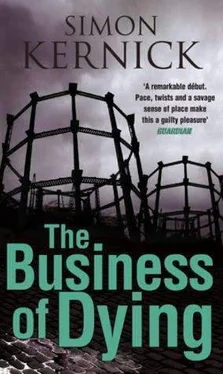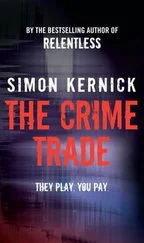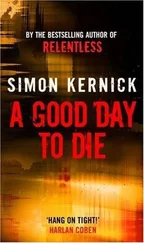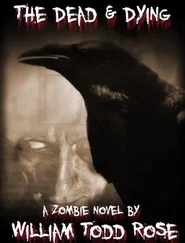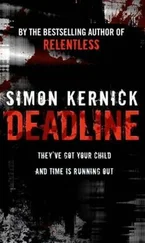Simon Kernick - The Business of Dying
Здесь есть возможность читать онлайн «Simon Kernick - The Business of Dying» весь текст электронной книги совершенно бесплатно (целиком полную версию без сокращений). В некоторых случаях можно слушать аудио, скачать через торрент в формате fb2 и присутствует краткое содержание. Жанр: Полицейский детектив, на английском языке. Описание произведения, (предисловие) а так же отзывы посетителей доступны на портале библиотеки ЛибКат.
- Название:The Business of Dying
- Автор:
- Жанр:
- Год:неизвестен
- ISBN:нет данных
- Рейтинг книги:4 / 5. Голосов: 1
-
Избранное:Добавить в избранное
- Отзывы:
-
Ваша оценка:
- 80
- 1
- 2
- 3
- 4
- 5
The Business of Dying: краткое содержание, описание и аннотация
Предлагаем к чтению аннотацию, описание, краткое содержание или предисловие (зависит от того, что написал сам автор книги «The Business of Dying»). Если вы не нашли необходимую информацию о книге — напишите в комментариях, мы постараемся отыскать её.
The Business of Dying — читать онлайн бесплатно полную книгу (весь текст) целиком
Ниже представлен текст книги, разбитый по страницам. Система сохранения места последней прочитанной страницы, позволяет с удобством читать онлайн бесплатно книгу «The Business of Dying», без необходимости каждый раз заново искать на чём Вы остановились. Поставьте закладку, и сможете в любой момент перейти на страницу, на которой закончили чтение.
Интервал:
Закладка:
To remedy this, however, there was going to be a series of raids the following morning at the homes of a number of mugging suspects, aged between twelve and sixteen, one or more of whom could well have been involved in the attack on the old lady. There were nine homes in all to search, so it was going to involve all of us. 'It's time to take the battle to them,' he concluded loudly, but for me the message was muted. I remembered him saying exactly the same thing a few months back about crack dealers in the area. We'd simultaneously raided a total of fourteen premises in an operation Knox had cunningly codenamed 'Street Shock', had recovered drugs with a street value of more than twenty-five grand, and made a total of nine arrests. Five suspects were later released without charge; one absconded while on bail and hadn't been seen since; one pleaded guilty and received a fine and suspended sentence; one was acquitted by a jury who believed his story that he hadn't known the stuff was in the house; and one was now in custody awaiting trial, having previously been released on bail and re-arrested twice in the space of three weeks for dealing. The only shock was the one the taxpayers would get if they ever discovered what a pathetically negligible effect such an expensive and time-consuming operation had had on both the criminals and the local crime figures. It was hardly a wonder our clear-up rate was so bad. Most of the time, it just wasn't worth the bother.
I had a brief chat with Malik after the meeting had concluded, but neither of us had time to cover much ground. He was now heavily involved in the mugging case and was keen to make a good impression.
After that, Knox had me writing up reports on all my current cases, which took all morning and a good part of the afternoon. He told me Capper wanted to take a look at what I was working on to see if there was any mileage in giving me additional resources; or, in other words, to see if there were any mistakes I was making. Apparently, the two of them were particularly keen for movement on the armed robbery case, which appeared to have ground to a complete halt. Which was true. It had. But I wasn't quite sure what more I or any of my colleagues could do to kickstart it. If no one gives you information and the perpetrators haven't left any obvious clues, a detective's room for manoeuvre is somewhat limited. But it transpired that the Chief Superintendent had had a meeting with representatives of the Kurdish community (both the victims – the shop-owner's wife and the customer – were Kurds) who'd told him they wouldn't rest until the culprits were caught. They had also raised that possibility, so dreaded of all senior Met officers, that racism might be playing a part in holding things up. Obviously, the Chief Super was keen to show his community bridge-building skills, and since much of the work on the case had been done by me, I was going to have to indulge in some serious arse-covering. Knox also suggested that at a later date I too might have to prostrate myself in front of these so-called representatives of the community so that they could have a go at me as well – another good reason to resign, if ever I needed one.
It was difficult to concentrate on the report writing. I kept thinking of the sex with Carla, and wishing that I could repeat the experience. I had to make a conscious effort not to call her number. I knew she wouldn't appreciate it. Not today. She was, as she said, a woman who liked her independence. Fair enough. I'm a man who likes mine – most of the time anyway – but I still harboured hopes that I could get something going with her.
Some time around lunchtime, Jean Ashcroft phoned again. She asked me if I'd been round to see Danny. I told her I hadn't but that I'd phoned him, and everything seemed all right. She said she'd tried to get hold of him but he wasn't answering his phones, and I mentioned that he'd gone away on holiday for a couple of weeks.
'Did you find out where he was getting his money from?' she asked. 'It's just not like him to have any, you know.'
I told her that I wasn't sure (I'd given up on the police informant story, thinking it might prompt her into further investigation), but said that I didn't think it was anything to be overly concerned about. 'Maybe he's got less money than you think,' I added. 'You can get these last-minute deals for hardly anything now, so I expect he just picked up something cheap. I checked with some colleagues up his way and they say he's not in the frame for anything they've got on the go.'
'But he didn't say anything about what was worrying him?'
'No. But I wouldn't read too much into it. He didn't sound like he had anything serious on his mind, and I can usually tell. It's my job.'
'Did you say it was yesterday he went on holiday?'
'That's what he told me he was doing when I called him.'
'Well, I've tried his mobile this morning and he's still not answering.'
I said that this was probably because he couldn't get a signal where he was, and I think I managed to convince her not to panic about it. 'He'll call back soon, I'm sure,' I said, but for the first time I began to get a bad feeling about it all. I made a mental note to call Raymond when I got the chance, just to confirm that neither he nor his jittery associates had tried to track Danny down. Finally, I said my goodbyes to Jean and got back to my report writing.
I left the station at five thirty that night, having got the feeling that under Capper I was going to be pushed to one side of things, and that my time at the station really was coming to an end. I fancied a drink, if only to get rid of the dry, sour taste in my mouth and the worries constantly surfacing in my head, but decided instead to go and visit DI Welland in hospital. It was duty, really. I don't like going to hospitals (who does?), but Welland needed some moral support. When I'd been put in one three years ago, having received an enthusiastic tap on the head with an iron bar when an arrest went wrong, he'd visited me three times in the six days I'd been in there. The least I could do now was return the favour.
He was being treated at St Thomas's, and it was five past six when I got there, armed with a jumbo box of wine gums, which were always his favourite, and a couple of American true crime magazines.
Hospitals always smell so uninviting and, in England at least, they usually look it too. Being a copper, I've had to spend more than my fair share of time in them. Aside from the many visits I'd made to interview victims and sometimes the perpetrators of crime, I'd ended up being on the receiving end of treatment on three separate occasions, all work-related. There'd been the iron bar incident; the time during my probationary period when a mob of rampaging Chelsea fans had used me for kicking practice; and an incident early on in the Poll Tax riot when a huge crop-headed dyke had whacked me over the back of the head with a four by four while I'd been trying to resuscitate some old granny who'd just fainted. In that case my assailant had been arrested on the spot and, ironically enough, had turned out to be a nurse.
Welland was in a ward at the back of the hospital and they'd got him a private room. He was sitting up in bed in his pyjamas reading the Evening Standard when I knocked and went in. He was much paler than usual, like he was a bit seasick, but he didn't appear to have lost any weight, and all in all he didn't look quite as rough as I'd expected.
He looked up and managed a smile when he saw me. 'Hello, Dennis.'
'How are you, boss?'
'I'm sure I've been worse, but I can't honestly remember when.'
'Well, you look all right for it. Have they started the treatment yet?'
'No, it's been postponed until tomorrow. Lack of specialist staff, something like that.'
'That's the NHS for you. They make the Met look overmanned. Here, I brought you these.' I put the wine gums and magazines down by the side of the bed. He thanked me, and with a quick gesture offered me a seat.
Читать дальшеИнтервал:
Закладка:
Похожие книги на «The Business of Dying»
Представляем Вашему вниманию похожие книги на «The Business of Dying» списком для выбора. Мы отобрали схожую по названию и смыслу литературу в надежде предоставить читателям больше вариантов отыскать новые, интересные, ещё непрочитанные произведения.
Обсуждение, отзывы о книге «The Business of Dying» и просто собственные мнения читателей. Оставьте ваши комментарии, напишите, что Вы думаете о произведении, его смысле или главных героях. Укажите что конкретно понравилось, а что нет, и почему Вы так считаете.
